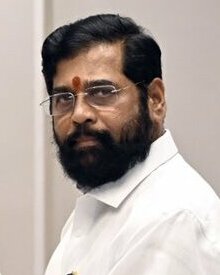| No. | Portrait | Minister
(Constituency) | Term of office | Political party | Ministry | Chief Minister |
|---|
| From | To | Period |
|---|
| Minister of Housing |
|---|
| 01 | | | Sultan. G. Kazi
(MLC for Elected by Local Authorities Constituency No. 14 -
Ahmednagar District)
(Legislative Council) | 01 May
1960 | 07 March
1962 | 1 year, 310 days | Indian National Congress | Yashwantrao I | 
Yashwantrao Chavan |
|---|
| 02 | | | Homi J. H. Taleyarkhan
(MLC for Elected by MLAs Constituency No. 22 -
Mumbai Suburban District)
(Legislative Council) | 08 March
1962 | 19 November
1962 | 256 days | Indian National Congress | Yashwantrao II |
|---|
| 03 | | | Homi J. H. Taleyarkhan
(MLC for Elected by MLAs Constituency No. 22 -
Mumbai Suburban District)
(Legislative Council) | 20 November
1962 | 24 November
1963 | 1 year, 4 days | Indian National Congress | Kannamwar l | Marotrao Kannamwar |
|---|
| 04 | | | P. K. Sawant
(MLA for Chiplun Constituency No. 265-
Ratnagiri District)
(Legislative Assembly)
(Interim Chief Minister) | 25 November
1962 | 04 December
1963 | 9 days | Indian National Congress | Sawant I | P. K. Sawant |
|---|
| 05 | | | Homi J. H. Taleyarkhan
(MLC for Elected by MLAs Constituency No. 22 -
Mumbai Suburban District)
(Legislative Council) | 05 December
1963 | 01 March
1967 | 3 years, 86 days | Indian National Congress | Vasantrao I | 
Vasantrao Naik |
|---|
| 06 | | | D. S. Palaspagar
(MLC for Elected by MLAs Constituency No. 19 -
Bhandara District)
(Legislative Council) | 01 March
1967 | 27 October
1969 | 2 years, 240 days | Indian National Congress | Vasantrao II |
|---|
| 07 | | | Gopalrao Bajirao Khedkar
(MLA for Akot Constituency No. 28-
Akola District)
(Legislative Assembly) | 27 October
1969 | 13 March
1972 | 2 years, 138 days | Indian National Congress |
|---|
| 08 | | | Yashwantrao Mohite
(MLA for Karad South Constituency No. 260-
Satara District)
(Legislative Assembly) | 13 March
1972 | 04 April
1973 | 1 year, 32 days | Indian National Congress | Vasantrao III |
|---|
| 09 | |  | Vasantrao Naik
(MLA for Pusad Constituency No. 81-
Yavatmal District)
(Legislative Assembly)
(Chief Minister) | 04 April
1973 | 17 Match
1974 | 347 days | Indian National Congress |
|---|
| 10 | | | Anant Namjoshi
(MLA for Girgaon Constituency No. 185-
Mumbai City District)
(Legislative Assembly) | 17 Match
1974 | 21 February
1975 | 341 days | Indian National Congress |
|---|
| 11 | | 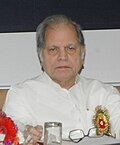
| Abdul Rahman Antulay
(MLA for Shrivardhan Constituency No. 193-
Raigad District)
(Legislative Assembly) | 21 February
1975 | 13 September
1976 | 1 year, 205 days | Indian National Congress | Shankarrao I | 
Shankarrao Chavan |
|---|
| 12 | | 
| Pratibha Patil
(MLA for Jalgaon City Constituency No. 13-
Jalgaon District)
(Legislative Assembly) | 13 September
1976 | 17 May
1977 | 246 days | Indian National Congress |
|---|
| 13 | | | Vasant Hoshing
(MLA for Byculla Constituency No. 184-
Mumbai City District
(Legislative Assembly) | 17 May
1977 | 07 March
1978 | 1 year, 294 days | Indian National Congress | Vasantdada I | 
Vasantdada Patil |
|---|
| 14 | | | Sudhakarrao Naik
(MLA for Pusad Constituency No. 81-
Yavatmal District)
(Legislative Assembly) | 07 March
1978 | 18 July
1978 | 133 days | Indian National Congress (U) | Vasantdada II |
|---|
| 15 | | | Jagannathrao Jadhav
(MLA for Sangameshwar Constituency No. 173-
Ratnagiri District
(Legislative Assembly) | 18 July
1978 | 17 February
1980 | 1 year, 214 days | Janata Party | Pawar I | 
Sharad Pawar |
|---|
| 16 | | | Pramilaben Yagnik
(MLC for Governor Nominated No. 11 -
Nagpur District)
(Legislative Council) | 09 June
1980 | 21 January
1982 | 1 year, 226 days | Indian National Congress | Antulay | 
Abdul Rahman Antulay |
|---|
| 17 | | | S. M. I. Aseer
(MLA for Ahmednagar South Constituency No. 223-
Ahmednagar District
(Legislative Assembly) | 21 January
1982 | 11 October
1982 | 263 days | Indian National Congress | Bhosale | 
Babasaheb Bhosale |
|---|
| 18 | | 
| Pratibha Patil
(MLA for Jalgaon City Constituency No. 13-
Jalgaon District)
(Legislative Assembly) | 11 October
1982 | 02 February
1983 | 114 days | Indian National Congress |
|---|
| 19 | | | Narendra Marutrao Kamble
(MLC for Elected by Governor Nominated No. 10 -
Mumbai City District)
(Legislative Council) | 07 February
1983 | 05 March
1985 | 2 years, 26 days | Indian National Congress | Vasantdada III | 
Vasantdada Patil |
|---|
| 20 | | | V. Subramanian
(MLA for South Mumbai Constituency No. 121-
Mumbai City District)
(Legislative Assembly) | 12 March
1985 | 03 June
1985 | 83 days | Indian National Congress | Vasantdada IV |
|---|
| 21 | | | V. Subramanian
(MLA for South Mumbai Constituency No. 121-
Mumbai City District)
(Legislative Assembly) | 03 June
1985 | 12 March
1986 | 282 days | Indian National Congress | Nilangekar | Shivajirao Patil Nilangekar |
|---|
| 22 | | | V. Subramanian
(MLA for South Mumbai Constituency No. 121-
Mumbai City District)
(Legislative Assembly) | 12 March
1986 | 26 June
1988 | 2 years, 106 days | Indian National Congress | Shankarrao II | 
Shankarrao Chavan |
|---|
| 23 | | | W. R. Sherekar
(MLC for Elected by MLAs Constituency No. 22 -
Chandrapur District)
(Legislative Council) | 26 June
1988 | 03 March
1990 | 1 year, 250 days | Indian National Congress | Pawar II | 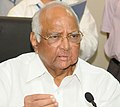
Sharad Pawar |
|---|
| 24 | | | Javed Iqbal Khan
(MLA for Trombay Constituency No. 177-
Mumbai Suburban District)
(Legislative Assembly) | 04 March
1990 | 25 June
1991 | 1 year, 113 days | Indian National Congress | Pawar III |
|---|
| 25 | | | Javed Iqbal Khan
(MLA for Trombay Constituency No. 177-
Mumbai Suburban District)
(Legislative Assembly) | 25 June
1991 | 22 February
1993 | 1 year, 242 days | Indian National Congress | Sudhakarrao | Sudhakarrao Naik |
|---|
| 26 | | 
| Chhagan Bhujbal
(MLA for Mazgaon constituency No. 210-
Mumbai Suburban District)
(Legislative Assembly) | 06 March
1993 | 14 March
1995 | 2 years, 8 days | Indian National Congress | Pawar IV | 
Sharad Pawar |
|---|
| 27 | | | Chandrakant Khaire
(MLA for Aurangabad West Constituency No. 108-
Chhatrapati Sambhaji Nagar District Also Previously Known Aurangabad District
(Legislative Assembly) | 14 March
1995 | 09 June
1997 | 2 years, 87 days | Shiv Sena | Joshi | 
Manohar Joshi |
|---|
| 28 | |  | Manohar Joshi
(MLA for Dadar Constituency No. 181-
Mumbai City District)
(Legislative Assembly)
(Chief Minister) | 09 June
1997 | 31 January
1999 | 1 year, 236 days | Shiv Sena |
|---|
| 29 | | | Anna Dange
(MLC for Elected by MLAs Constituency No. 05 -
Sangli District)
(Legislative Council) | 01 February
1999 | 11 May
1999 | 99 days | Bharatiya Janata Party | Rane | 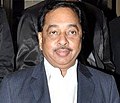
Narayan Rane |
|---|
| 30 | | | Sabir Shaikh
(MLA for Ambarnath Constituency No. 140-
Thane District)
(Legislative Assembly) | 11 May
1999 | 17 October
1999 | 159 days | Shiv Sena |
|---|
| 31 | | | Rohidas Patil
(MLA for Dhule Constituency No. 07-
Dhule District
(Legislative Assembly) | 19 October
1999 | 16 January
2003 | 3 years, 88 days | Indian National Congress | Deshmukh I | 
Vilasrao Deshmukh |
|---|
| 32 | | 
| Satish Chaturvedi
(MLA for Nagpur East Constituency No. 54-
Nagpur district)
(Legislative Assembly) | 18 January
2003 | 01 November
2004 | 1 year, 295 days | Indian National Congress | Sushilkumar | 
Sushilkumar Shinde |
|---|
| 31 | |  | Vilasrao Deshmukh
(MLA for Latur City Constituency No. 235-
Latur District)
(Legislative Assembly)
(Chief Minister) | 09 November
2004 | 01 December
2007 | 4 years, 22 days | Indian National Congress | Deshmukh II | 
Vilasrao Deshmukh |
|---|
| 32 | |  | Ashok Chavan
(MLA for Bhokar Constituency No. 85-
Nanded District)
(Legislative Assembly)
(Chief Minister) | 08 December
2008 | 06 November
2009 | 333 days | Indian National Congress | Ashok I | 
Ashok Chavan |
|---|
| 33 | |  | Ashok Chavan
(MLA for Bhokar Constituency No. 85-
Nanded District)
(Legislative Assembly)
(Chief Minister) | 07 November
2009 | 10 November
201p | 1 year, 3 days | Indian National Congress | Ashok II |
|---|
| 34 | |  | Prithviraj Chavan
(MLC for Elected by MLAs Constituency No. 19 -
Satara District)
(Legislative Council)
(Chief Minister) | 11 November
2010 | 26 September
2014 | 3 years, 319 days | Indian National Congress | Prithviraj | 
Prithviraj Chavan |
|---|
| 35 | | 
| Prakash Mehta
(MLA for Ghatkopar East Constituency No. 170-
Mumbai Suburban District
(Legislative Assembly) | 31 October
2014 | 16 June
2019 | 4 years, 228 days | Bharatiya Janata Party | Fadnavis I | 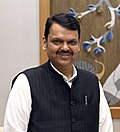
Devendra Fadnavis |
|---|
| 36 | | | Radhakrishna Vikhe Patil
(MLA for Shirdi Constituency No. 218-
Ahmednagar District)
(Legislative Assembly) | 16 June
2019 | 12 November
2019 | 149 days |
|---|
| 37 | |  | Devendra Fadnavis
(MLA for Nagpur South West Constituency No. 52-
Nagpur District)
(Legislative Assembly)
(Chief Minister)
(In Charge) | 23 November
2019 | 28 November
2019 | 5 days | Bharatiya Janata Party | Fadnavis II |
|---|
| 38 | | | Jayant Patil
(MLA for Islampur Constituency No. 283-
Sangli District)
(Legislative Assembly) | 28 November
2019 | 30 December
2019 | 32 days | Nationalist Congress Party | Thackeray | 
Uddhav Thackeray |
|---|
| 39 | | | Jitendra Awhad
(MLA for Mumbra-Kalwa Constituency No. 149-
Thane District
(Legislative Assembly) | 30 December
2019 | 29 June
2022 | 2 years, 181 days | Nationalist Congress Party |
|---|
| 40 | |  | Eknath Shinde
(MLA for Kopri-Pachpakhadi Constituency No. 147-
Thane District)
(Legislative Assembly)
(Chief Minister)
(In Charge) | 30 June
2022 | 14 August
2022 | 45 days | Shiv Sena (Shinde Group) | Eknath | 
Eknath Shinde |
|---|
| 41 | |  | Devendra Fadnavis
(MLA for Nagpur South West Constituency No. 52-
Nagpur District)
(Legislative Assembly)
(Deputy Chief Minister) | 14 August
2022 | 14 July
2023 | 334 days | Bharatiya Janata Party |
|---|
| 42 | | | Atul Save
(MLA for Aurangabad East Constituency No. 109-
Chhatrapati Sambhaji Nagar District Also Previously Known Aurangabad District
(Legislative Assembly) | 14 July
2023 | 26 November
2024 | 1 year, 135 days | Bharatiya Janata Party |
|---|
| 43 | |  | Devendra Fadnavis
(MLA for Nagpur South West Constituency No. 52-
Nagpur District)
(Legislative Assembly)
(Chief_Minister)
In Charge | 05 December
2024 | 21 December
2024 | 16 days | Bharatiya Janata Party | Fadnavis III | 
Devendra Fadnavis |
|---|
| 44 | |  | Eknath Shinde
(MLA for Kopri-Pachpakhadi Constituency No. 147-
Thane District)
(Legislative Assembly)
(Deputy Chief Minister) | 21 December
2024 | Incumbent | 294 days | Shiv Sena (Shinde Group) |
|---|
|




